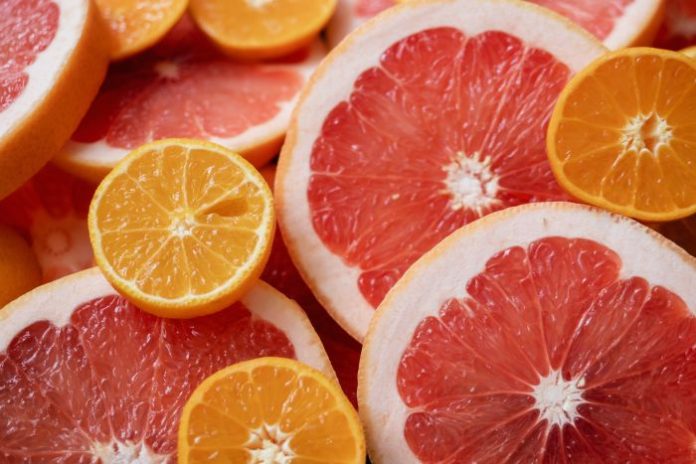
The term citrus fruit comes from the Latin ‘agrumen’ (sour taste). The distinctive flavour of oranges, mandarins, clementines, lemons and grapefruit is known to most people, certainly to a greater extent than their extraordinary health properties.
Citrus cultivation in Basilicata was introduced by the Arabs and was initially located along the Agri and Sinni rivers, thanks to the availability of water. The spread was possible because Lucanian farmers multiplied many local ecotypes mainly on the Ionian coast, which has a particularly mild climate and very fertile soil.
Belonging to the Rutaceae family, subfamily Aurantioideae, genus Citrus, citrus fruits are a very important source of phytonutrients or bioactive molecules. The nutritional importance of citrus fruits was already known at the end of the 18th century, when large quantities of the fruit were shipped on ships to prevent scurvy, a disease caused by a lack of ascorbic acid (vitamin C).
It is a water-soluble vitamin, which cannot be synthesised or accumulated in the body, but must be taken regularly through the diet. The recommended daily intake of vitamin C for an adult is 100 mg per day in males and about 80 mg in females, while for pregnant women and nursing mothers the recommended ration increases to 100 mg per day and 130 mg per day respectively. As well as dissolving in water, vitamin C is sensitive to high temperatures, so it is completely lost when cooked in water. Therefore, the main sources of vitamin C, apart from citrus fruits, are fresh vegetables (fruit and vegetables) such as: kiwis, strawberries and red fruits, peppers, tomatoes, broccoli, cabbage, Brussels sprouts, spinach etc…
Vitamin C is essential for human health as it helps neutralise free oxygen radicals responsible for oxidative stress, a form of chemical stress responsible for damage to the body’s cells and, consequently, for many human diseases and the physiological process of ageing. Vitamin C also improves intestinal absorption and thus the bioavailability of non-haem iron, contained in plants. Antioxidant, cholesterol-lowering, antiviral and anti-carcinogenic properties have also been attributed to other phytomolecules that are very abundant in citrus fruits, known as terpenoids, which are responsible for the plants’ defence strategy.
Carotenoids, which provide the orange-red colour to fruit and vegetables, are powerful antioxidants with therapeutic effects in a number of diseases including cardiovascular disease and osteoporosis, but also act against inflammation and cancer.
Another class of bioactive molecules that citrus fruits are rich in are polyphenols, in particular flavonoids and anthocyanins. The effects of flavonoids include mainly antithrombotic, anti-ischemic, antioxidant and vasorelaxant, as well as anti-inflammatory activities. Anthocyanins are pigments not only endowed with antioxidant capacities, but also able to influence the expression of proteins involved in the regulation of inflammatory processes and related to tumour progression.
Closely linked to its proven antioxidant power is its anti-inflammatory and immunostimulant action, as it is involved in fundamental processes for defence against external pathogens. It is no coincidence that, in the context of the COVID-19 pandemic we are currently experiencing, vitamin C has often been ‘invoked’ for its preventive or even curative effects on SARS-CoV-2 pneumonia. To date, there is no robust scientific evidence in favour of vitamin C supplementation as prevention and treatment for COVID-19.
On the other hand, it is well known, as supported by various authoritative scientific studies, that the evolution of the disease is linked to hyperinflammation and respiratory distress in affected patients; in other words, the most serious complications of COVID-19 are due to a storm of cytokines, i.e. molecules that play the role of communication signals between the cells of the immune system, with a pro-inflammatory action.
A healthy, balanced and varied diet, rich in foods with the properties described for vitamin C, can, in general, contribute to significantly lowering inflammatory markers and providing the body with bioactive compounds with anti-inflammatory and immunostimulating properties. Not so much the individual food, but the combinations of various foods (nutritional patterns) that we introduce into our bodies can stimulate specific metabolic pathways and functions within the body.
Scientific evidence suggests that, in particular, fruit, vegetables and legumes contain high amounts of health-promoting molecules, being an incredible reservoir of functional molecules, as well as vitamins and minerals.
In this context and in the light of this evidence, the importance of taking adequate amounts of vitamin C on a daily basis is clear, especially at this time of year and in view of the current health emergency, as their consumption respects the seasonality of the vitamin, which enhances the benefits described.





































